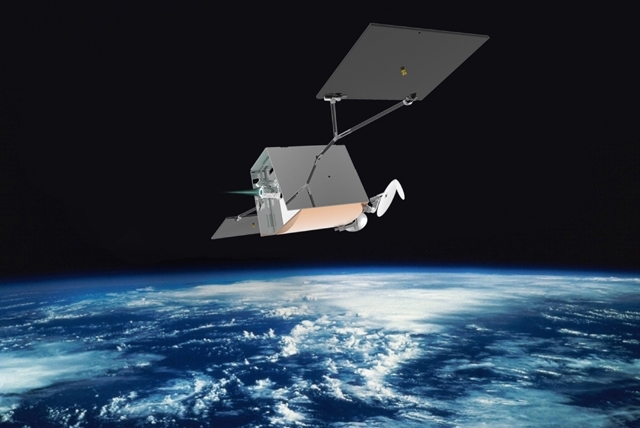Telecom Giant Intelsat announces Merger Agreement with Internet Startup OneWeb
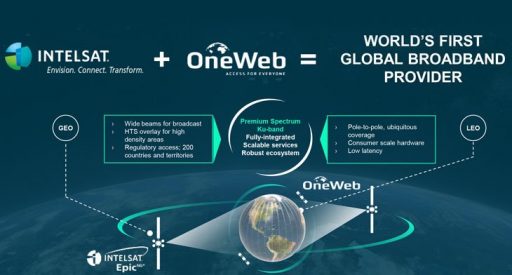
Communications giant Intelsat and emerging satellite Internet company OneWeb announced a proposed merger on Tuesday that would bring together a fleet of high-capacity telecommunications satellites in Geostationary Orbit and a planned constellation of 900 low-orbiting broadband Internet satellites delivering global coverage.
Intelsat announced the “Conditional Combination Agreement” on Tuesday, detailing a share-for-share merger that would be followed by a $1.7 billion investment in the combined company by Japan’s SoftBank, reducing Intelsat’s $15 billion debt by $3.6 billion after the company faced struggles with falling prices for satellite broadband and reduced government business over recent years.
“We believe that combining Intelsat with OneWeb will create an industry leader unique in its ability to provide affordable broadband anywhere in the world,” said Stephen Spengler, Intelsat CEO. “By merging OneWeb’s LEO satellite constellation and innovative technology with our global scale, terrestrial infrastructure and GEO satellite network, we will create advanced solutions that address the need for ubiquitous broadband.”
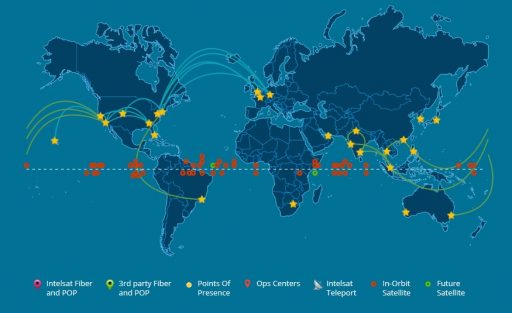
The OneWeb fleet, currently planned to consist of nearly 900 satellites in Low Earth Orbit, will be operated as a fully-integrated hybrid network with Intelsat’s constellation of satellites in Geostationary Orbit, residing 36,000 Kilometers above the equator. Together, the two complementary segments can support wide scale broadband services with connection speeds matching terrestrial networks.
Intelsat, headquartered in Luxembourg and Virginia, started out back in 1964 as an intergovernmental organization, supplying services to nearly 150 countries by the mid-70s and supporting NASA’s Apollo program by relaying communications from ground stations around the world. The firm was privatized in 2001 and sold to four private equity firms in 2005. Over the years, Intelsat absorbed a number of other companies including former rival PanAmSat, making Intelsat the largest provider of fixed satellite services with a fleet of over 50 active spacecraft delivering the entire spectrum of communications services to a worldwide customer base.
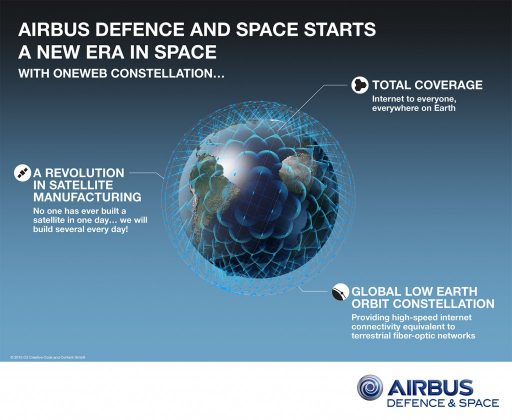
OneWeb, formerly WorldVu, was founded as a global communications company by Greg Whyler with the intent of creating a network of 648 satellites in Low Earth Orbit to deliver Internet to “reach hundreds of millions of potential users residing in places without existing broadband access”. OneWeb raised $500 million in capital in 2015 and received $1 billion from SoftBank in late 2016 plus $200 million from other private investors. The company said in February that capacity of the initial satellite constellation had almost been sold and OneWeb was aiming to add 1,972 satellites to their constellation, orbiting at different altitudes.
“With SoftBank’s support we will build the world’s first truly global broadband company, accelerating our mission of bridging the digital divide by connecting the four billion people without access today,” said Greg Whyler, Founder and Executive Chairman of OneWeb. “While there are numerous growth paths available to OneWeb, we are very excited at the prospect of working with Intelsat on this shared objective.”

OneWeb is about to take a major step toward the realization of the largest constellation of satellites to be deployed to orbit, set to begin construction of the company’s satellite factory in Exploration Park, just outside Florida’s Kennedy Space Center. A groundbreaking ceremony planned for Friday had to be postponed due to scheduling problems, though OneWeb expects the first satellites to be shipped from the factory next year.
The first ten OneWeb satellites are scheduled for launch atop a Soyuz rocket blasting off from the Guiana Space Center next year. Launches will then be split between the Europeanized Soyuz, the traditional Soyuz launching from Baikonur & Vostochny in Russia and Virgin Galactic’s LauncherOne that can launch between one and three OneWeb satellites while Soyuz can lift up to three dozen satellites.
Through the end of 2020, OneWeb has contracted six Soyuz rockets from French Guiana, 15 Soyuz rockets from Russian Cosmodromes and 39 LauncherOne missions that would be primarily used to replenish the satellite fleet in case of failures. The company has options for another five Soyuz rockets, three Ariane 6 launch opportunities and another 100 launches on LauncherOne should the decision be made to expand the current plan of 882 active satellites.
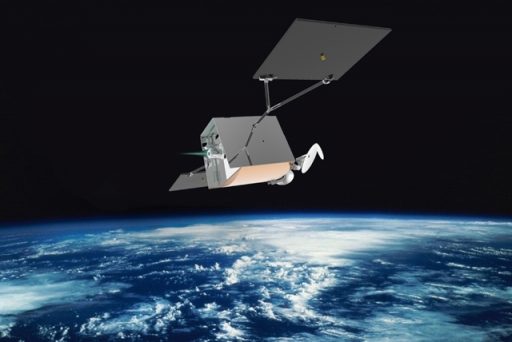
Orbiting 1,200 Kilometers in altitude, around 30 times closer than a Geostationary Satellite, allows OneWeb to cut the system’s latency and provide services more comparable to terrestrial networks. According to Intelsat, the OneWeb constellation will become a fully integrated part with the 50+ satellites in Geostationary Orbit for robust and flexible communications services via interoperable ground terminals.
OneWeb joined forces with Airbus Defence and Space and founded OneWeb Satellites, the company responsible for mass producing the 150-Kilograms satellites at a desired cost of under $500,000 per unit. The factory in Florida will use an assembly-line type approach to manufacture three satellites per day, making it the first high-volume satellite assembly plant and creating around 250 jobs at the Space Coast.
The first ten prototype OneWeb satellites are being manufactured at Airbus in Toulouse, France to be ready for launch in early 2018 to validate the functionality of the system in an operational mission scenario. Operational launches will begin around half a year later at a cadence of around three weeks to establish the constellation with an initial in-service date of late 2019 with full global coverage around one year after that. Intelsat had previously agreed to take over day-to-day operations of the satellite constellation and regular maintenance tasks.
Through the $1.7 billion investment, SoftBank will hold a 40% stake in the combined company. Stephen Spengler would be the CEO of the combination and Whyler would acts as executive chairman. Under the agreement, Intelsat and OneWeb will remain two separate divisions with Intelsat receiving a commission for selling OneWeb’s capacity.
The merger of Intelsat with OneWeb and the SoftBank investment are all dependent on each other and will require Intelsat to complete its debt exchange within three months of the date of the agreement for the deal to close.

